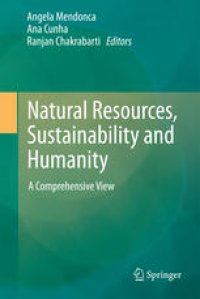
Ebook: Natural Resources, Sustainability and Humanity: A Comprehensive View
- Tags: Environment general, Biogeosciences, Climate Change, Climate Change, Sustainable Development, Education (general)
- Year: 2012
- Publisher: Springer Netherlands
- Edition: 1
- Language: English
- pdf
Shortly, this book is the written up-graded version of the topics discussed during the Small Meeting of the 2nd International School Congress: Natural Resources, Sustainability and Humanity, held in Braga, Portugal, 5-8 May 2010 with the diverse participation of scientists, educators and governmental representatives.
The Earth hosts an immense ecosystem, colonized by millions of species for billions of years but only for a few tens of thousands of years by humans. Environmental history tells though that it was humankind that shaped the environment as no other species. History, geography, religion and politics among other reasons have differentiated populations with respect to access to safe food and water, education, health, and to space and natural resource utilization. The globalization era of trade, information and communication is shortening distances and increasing overall wealth, but, as is pointed out in this book, it is also contributing to the propagation of diseases, and to the modification or even destruction of native ecosystems by exotic invasive species.
Man is the only species that has the perception of its history, evolution, of the consequences of its decisions, and that there is a future ahead. It is also the only species that has the potential to change it. This awareness can be a source of anxiety and contradictory behaviours, but it is also the key to changing attitudes towards the construction of a common sustainable home, by committed education, interdisciplinary approaches, mobilization and empowerment of people and political consonant actions.
Shortly, this book is the written up-graded version of the topics discussed during the Small Meeting of the Second International School Congress: Natural Resources, Sustainability and Humanity, held in Braga, Portugal, 5-8 May 2010 with the diverse participation of scientists, educators and governmental representatives.
The Earth hosts an immense ecosystem, colonized by millions of species for billions of years but only for a few tens of thousands of years by humans. Environmental history tells though that it was humankind that shaped the environment as no other species. History, geography, religion and politics among other reasons have differentiated populations with respect to access to safe food and water, education, health, and to space and natural resource utilization. The globalization era of trade, information and communication is shortening distances and increasing overall wealth, but, as is pointed out in this book, it is also contributing to the propagation of diseases, and to the modification or even destruction of native ecosystems by exotic invasive species.
Man is the only species that has the perception of its history, evolution, of the consequences of its decisions, and that there is a future ahead. It is also the only species that has the potential to change it. This awareness can be a source of anxiety and contradictory behaviours, but it is also the key to changing attitudes towards the construction of a common sustainable home, by committed education, interdisciplinary approaches, mobilization and empowerment of people and political consonant actions.
Shortly, this book is the written up-graded version of the topics discussed during the Small Meeting of the Second International School Congress: Natural Resources, Sustainability and Humanity, held in Braga, Portugal, 5-8 May 2010 with the diverse participation of scientists, educators and governmental representatives.
The Earth hosts an immense ecosystem, colonized by millions of species for billions of years but only for a few tens of thousands of years by humans. Environmental history tells though that it was humankind that shaped the environment as no other species. History, geography, religion and politics among other reasons have differentiated populations with respect to access to safe food and water, education, health, and to space and natural resource utilization. The globalization era of trade, information and communication is shortening distances and increasing overall wealth, but, as is pointed out in this book, it is also contributing to the propagation of diseases, and to the modification or even destruction of native ecosystems by exotic invasive species.
Man is the only species that has the perception of its history, evolution, of the consequences of its decisions, and that there is a future ahead. It is also the only species that has the potential to change it. This awareness can be a source of anxiety and contradictory behaviours, but it is also the key to changing attitudes towards the construction of a common sustainable home, by committed education, interdisciplinary approaches, mobilization and empowerment of people and political consonant actions.
Content:
Front Matter....Pages 1-1
What Does Environmental History Teach?....Pages 1-15
New Orleans: An Environmental History of Disaster....Pages 17-28
Towards a Global History of Environment, Water and Climate....Pages 29-36
The Contribution of the Barcode of Life Initiative to the Discovery and Monitoring of Biodiversity....Pages 37-68
Increasing Pressure at the Bottom of the Ocean....Pages 69-81
Biological Invasions and Global Trade....Pages 83-99
Psychology for the Sake of the Environment....Pages 101-113
Promoting Critical Thinking to High School Students When Teaching About Climate Change Through a Participatory Approach....Pages 115-125
Participatory Development of Fotonovelas for Environmental Education and Community Empowerment....Pages 127-141
Participation and the Construction of Sustainable Societies....Pages 143-166
Dragonfly....Pages 167-180
Integrating Environmental Concerns into Development Assistance Policy....Pages 181-187
The World We Want and the World We Have....Pages 189-197
Back Matter....Pages 192-192